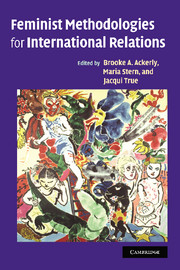Book contents
- Frontmatter
- Contents
- Notes on the contributors
- Acknowledgments
- 1 Feminist methodologies for International Relations
- Part I Methodological conversations between feminist and non-feminist IR
- Part II Methods for feminist International Relations
- 5 Motives and methods: using multi-sited ethnography to study US national security discourses
- 6 Methods for studying silences: gender analysis in institutions of hegemonic masculinity
- 7 Marginalized identity: new frontiers of research for IR?
- 8 From the trenches: dilemmas of feminist IR fieldwork
- 9 Racism, sexism, classism, and much more: reading security-identity in marginalized sites
- Part III Methodologies for feminist International Relations
- Conclusion
- Bibliography
- Index
9 - Racism, sexism, classism, and much more: reading security-identity in marginalized sites
Published online by Cambridge University Press: 12 January 2010
- Frontmatter
- Contents
- Notes on the contributors
- Acknowledgments
- 1 Feminist methodologies for International Relations
- Part I Methodological conversations between feminist and non-feminist IR
- Part II Methods for feminist International Relations
- 5 Motives and methods: using multi-sited ethnography to study US national security discourses
- 6 Methods for studying silences: gender analysis in institutions of hegemonic masculinity
- 7 Marginalized identity: new frontiers of research for IR?
- 8 From the trenches: dilemmas of feminist IR fieldwork
- 9 Racism, sexism, classism, and much more: reading security-identity in marginalized sites
- Part III Methodologies for feminist International Relations
- Conclusion
- Bibliography
- Index
Summary
We are women, poor, indigenous; we are … triply discriminated against.
‘Onelia’The [Civil Patrols] always threaten the women. [They ask,] “Why don't you have husbands, where do you get these bad ideas?” [Once] the chief of the patrols said: “Now we are going to put all the patrollers together and all the widows together … These women need husbands, because now they are not doing anything, that is why they are organizing … take two or three for each of you”… Several days ago [someone told me] that they raped four women.
‘Carmen’My consciousness was born [after fleeing from the army and hiding in the jungle]. It is not correct when they tell us today that we are not worth anything, that we don't have any participation in the society, in the development of Guatemala … The same situation that I have experienced since I was a child up until today has made me have this consciousness to rise up as women to guard our heritage, to guard our sacrifices … Always the female elders said that … when the Spanish came here to Guatemala, when they came to invade, our grandparents … were tortured, burned alive. All the books where they had their scriptures were burned … In this sense I understood … the situation that they talked about when I had to live it. So, I came to appreciate the elders because it is they who know more of the culture, how we have been for 500 years … For me it is painful that we have not [only] been suffering for ten, fifteen years, but we have resisted for 500 years.
‘Andrea’- Type
- Chapter
- Information
- Feminist Methodologies for International Relations , pp. 174 - 198Publisher: Cambridge University PressPrint publication year: 2006
- 23
- Cited by



